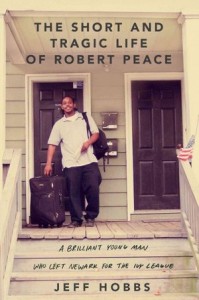[contextly_auto_sidebar id=”vsIAkFjrXusRtaqu8qZ48niChaYcVmTM”]
ONE of the breakout books of the fall is Jeff Hobbs’s new chronicle of his Yale roomate, a young black man who escaped the streets of Newark and found himself, in the end, pulled back down by some of the same old forces. I’m reading The Short and Tragic Life of Robert Peace now and amazed at how rich the detail is: It’s powerful — New York Times rave here — and about an intimate portrait of another life as any writer could render.
Which doesn’t entirely surprise me — I met Hobbs for an LA Times profile in 2007, around the time of his debut novel The Tourists. Between that book and a few meetings with him since, I’ve been struck by his powers of empathy and his apparent lack of ego. Here’s part of how the very young Hobbs struck me back then:
He was considered, he said, a “space cadet” as a teenager back home amid the mushroom farms of rural Delaware — the kind of kid who would often disappear under a tree to read Lloyd Alexander’s fantasy novels.
A serious runner in college, Hobbs seems most comfortable viewing the world from a distance. He’s so polite that while discussing his work on a patio behind a dive bar in Los Feliz, he apologized for the day’s intense breeze. Some combination of shyness and Ivy League reserve seemed to keep him from making more than a few indirect comments about his novel. A lot of the book, he said, is just “the stuff you overhear on the street, between strangers.”
The Tourists was a sketch of privilege, while The Short and Tragic Life is primarily about a very rough world. A lot of writers would not be able to pull off both.
In any case, I look forward to finishing his book about his Robert Peace. There’s no way Hobbs or anyone else can bring his old friend back, but reading this book, you really feel like you know the guy, as well as his fiercely protective mother. All of this a reader feel the tragedy ever harder, but I expect anyone who knows Peace, or someone like him, will be grateful for such a respectful work.

